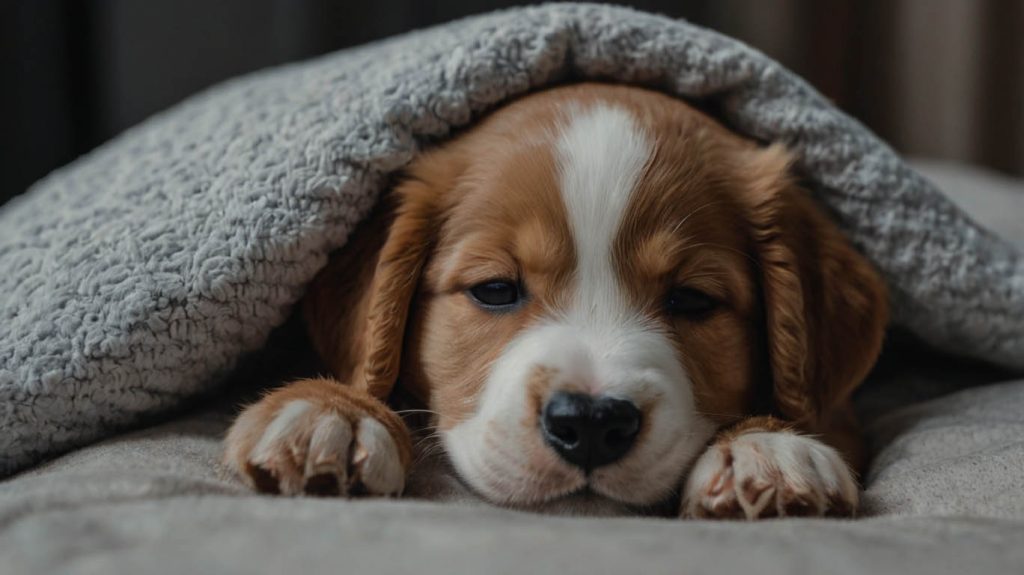You’ve brought home your new puppy. The first few hours are a whirlwind of joyful chaos—exploring the new space, pouncing on toys, and showering you with clumsy affection. They are a tiny, unstoppable ball of energy. Then, just as suddenly as it began, it stops. They wander over to a corner, curl into a ball, and are instantly fast asleep. They sleep so soundly and for so long that a new kind of worry begins to creep in. “Is this normal? Are they okay? Exactly how much sleep does a puppy need?”
This is a question every new puppy parent asks, and for good reason. In our busy human world, sleeping for most of the day seems lazy or even unhealthy. However, for a puppy, sleep is not just rest; it is one of the most critical and productive activities they will ever do. Consequently, understanding their sleep requirements is fundamental to raising a healthy, happy, and well-behaved companion. Therefore, this guide will demystify your puppy’s sleep habits and give you the confidence to know you’re providing the perfect environment for them to thrive.
The Critical Role of Sleep: Why Your Puppy Sleeps So Much
Before we put a number on it, it’s vital to understand why sleep is so essential for a puppy. Think of them as tiny construction sites working around the clock. Their bodies and brains are developing at an astonishing rate, and sleep is the time when all the most important work gets done.
- Physical Development: During sleep, a puppy’s body releases growth hormones. This is when their bones, muscles, and tissues grow and repair themselves. Sleep literally builds your puppy from the ground up.
- Brain and Nervous System Development: Sleep is crucial for consolidating memories and learning. Every new experience—from learning their name to understanding where to go potty—is processed and cemented in their brain while they sleep. Answering the question of how much sleep does a puppy need is key to supporting their training.
- Immune System Support: A well-rested puppy has a stronger immune system, making them better equipped to fight off potential illnesses and respond effectively to their vaccinations.
- Mood and Behavior Regulation: Just like a tired toddler, an under-slept puppy is often cranky, hyperactive, and nippy. Adequate sleep leads to a more even-tempered and trainable companion.

Answering the Big Question: How Much Sleep Does a Puppy Need by Age?
So, let’s get to the number that likely brought you here. The short answer is: a lot more than you think. While it varies slightly by breed and individual temperament, the general guidelines are quite consistent.
- Newborns (0-4 Weeks): In their first few weeks, puppies are essentially sleep-and-eat machines. They will sleep for up to 22 hours a day, only waking to nurse.
- Young Puppies (4-12 Weeks): This is the age most puppies come home. Be prepared for them to sleep 18-20 hours per day. This sleep will come in many short bursts throughout the day and a longer stretch at night.
- Older Puppies (3-6 Months): As they grow, their sleep needs slightly decrease, but not by much. They still require roughly 16-18 hours of sleep daily.
- Adolescent Puppies (6-12 Months): Your puppy will start to settle into a more adult-like pattern, but they still need more rest than a mature dog, typically around 14-16 hours a day.
It’s clear that understanding how much sleep a puppy needs reveals that they spend the majority of their early life snoozing, and this is perfectly healthy.
Decoding Puppy Sleep: What’s Happening When They’re Napping?
Puppy sleep can look a little strange to us. You might see them twitching, whimpering, kicking their legs, or even letting out little “woofs.” Don’t be alarmed! This is a completely normal sign that they are in a deep, active stage of sleep called REM (Rapid Eye Movement). This is the stage where their brain is busy processing the day’s events. So, when you see your puppy “running” in their sleep, they might just be dreaming about that fun game of fetch you played earlier.
How to Help Your Puppy Get the Sleep They Need: Creating the Perfect Routine
Knowing the numbers is one thing; ensuring your puppy gets that quality rest is another. Your role is to create a structure and environment that promotes healthy sleep habits.
The Magic of Crate Training for Quality Sleep
A crate is one of the most valuable tools for a new puppy owner. When introduced correctly, it’s not a jail; it’s a safe, cozy den—a private bedroom where they can relax without being disturbed. It’s an essential tool for house training and for enforcing a sleep schedule.
The Power of a Consistent Schedule and Enforced Naps
Puppies, much like young children, are not good at self-regulating. They often don’t know when they’re tired and can easily become overtired. An overtired puppy often looks hyperactive—getting the “zoomies,” becoming extra nippy, and refusing to settle down. Therefore, it’s your job to enforce nap time. A good rule of thumb is a schedule of one hour awake followed by two hours of napping in their crate. This prevents them from becoming overstimulated and ensures they get the rest they need. Creating a schedule around how much sleep a puppy needs is vital for a peaceful home.
Creating a Calming Bedtime Routine
A predictable bedtime routine signals to your puppy that it’s time to wind down for the night. This could look like:
- A final, calm play session.
- A last potty break outside.
- Dimming the lights in the house.
- Leading them to their crate with a special “bedtime” treat.
- Speaking in a calm, soothing voice as you lock the crate for the night.
This consistency helps them settle much more quickly and can improve the length of their nighttime sleep.

Common Questions and Concerns About How Much Sleep a Puppy Needs
Even with the right setup, you might have some lingering questions.
- What if my puppy cries in the crate at night? This is very common at first. Ensure all their needs are met (they’ve been to the potty, they aren’t hungry). You can try placing the crate in your bedroom so they know you’re close. Resist the urge to let them out when they cry, as this teaches them that crying gets them what they want.
- Should I wake my puppy up to play? A common saying among dog trainers is, “Let sleeping dogs lie.” Unless you need to wake them for a scheduled potty break, it’s best to let them get their rest. Their bodies and brains are hard at work.
When to Be Concerned About Your Puppy’s Sleep
While sleeping a lot is normal, there are a few red flags to watch out for. Contact your veterinarian if you notice:
- Extreme Lethargy: There’s a difference between normal sleepiness and lethargy. If your puppy is difficult to wake, seems groggy and uninterested in food or play when they are awake, or is sleeping significantly more than the upper range for their age, it’s worth a check-up.
- A Sudden Change in Habits: If your normally active puppy suddenly starts sleeping all the time, or vice-versa, it could signal an underlying issue.
Embrace the Quiet Moments
The answer to how much sleep does a puppy need is, reassuringly, a lot. This phase of near-constant napping is fleeting. By understanding and supporting their sleep needs, you are giving them the best possible start in life. So, embrace the quiet moments. Cherish the sleepy cuddles and the twitchy-nosed dreams. You are not just watching your puppy sleep; you are watching them grow into the amazing dog they are destined to be.
What has surprised you most about your puppy’s sleep schedule? Share your stories and questions in the comments below!


